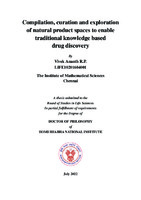- DSpace Home
- →
- IMSc Theses/ Dissertations
- →
- IMSc Theses/ Dissertations
- →
- View Item
JavaScript is disabled for your browser. Some features of this site may not work without it.
| dc.contributor.author | Vivek Ananth R.P | |
| dc.date.accessioned | 2022-12-19T05:36:05Z | |
| dc.date.available | 2022-12-19T05:36:05Z | |
| dc.date.issued | 2022 | |
| dc.date.submitted | 2022 | |
| dc.identifier.uri | https://dspace.imsc.res.in/xmlui/handle/123456789/608 | |
| dc.description.abstract | Endogenous secondary metabolites produced by living organisms are valuable natural products. Such secondary metabolites are produced primarily by plants, fungi and bacteria. Many natural products have been found to have useful therapeutic activity. By one estimate nearly 34% of the approved drugs are either natural products or natural product derived. Thus, characterization of novel natural product spaces will facilitate identification and development of new drugs. Medicinal plants and medicinal fungi have been used in traditional medicine across the world for treating many human ailments. Therefore, mapping the natural product space of medicinal plants and medicinal fungi will enable effective exploration of the natural product space for drug discovery. In this thesis, we first focus on the compilation, curation and exploration of the natural product space of Indian medicinal plants. Specifically, we have built a comprehensive database, IMPPAT (version 1.0 and 2.0), on Indian medicinal plants, their phytochemicals and therapeutic uses. IMPPAT provides a FAIR compliant non-redundant in silico stereo-aware library of 17967 phytochemicals with 2D and 3D chemical structures. Using cheminformatics based analysis, we have characterized the molecular complexity and molecular scaffold based structural diversity of the phytochemical space of Indian medicinal plants, and performed a comparative analysis with other chemical libraries. The compiled information in IMPPAT is accessible at: https://cb.imsc.res.in/imppat/. We have then built a manually curated database MeFSAT dedicated to secondary metabolites and therapeutic uses of medicinal fungi. MeFSAT provides information on 184 medicinal fungi, 1830 secondary metabolites and 149 therapeutic uses obtained from published research articles and books. We have further analyzed the curated secondary metabolite space and have presented the unique features of this natural product space. The compiled information in MeFSAT is accessible at: https://cb.imsc.res.in/ mefsat/. The thesis lastly describes a specific biological application of the curated phytochemical library from IMPPAT to identify potential anti-COVID lead molecules. In sum, the manually curated natural product spaces described in this thesis will enrich the known natural product space and will enable traditional knowledge based drug discovery. | en |
| dc.publisher.publisher | The Institute of Mathematical Sciences | |
| dc.subject | Drug Discovery | en_US |
| dc.subject | Herbal Drugs Database | en_US |
| dc.subject | Indian Medicinal Plants | en_US |
| dc.subject | HBNO Th219 | en_US |
| dc.title | Compilation curation and exploration of natural product spaces to enable traditional knowledge based drug discovery[HBNI Th219] | en_US |
| dc.type.degree | Ph.D | en_US |
| dc.type.institution | HBNI | en_US |
| dc.description.advisor | Areejit Samal | |
| dc.description.pages | 185p. | en_US |
| dc.type.mainsub | Computational Biology | en_US |
| dc.type.hbnibos | Life Sciences |
Files in this item
This item appears in the following Collection(s)
-
IMSc Theses/ Dissertations
IMSc Theses/ Dissertations
